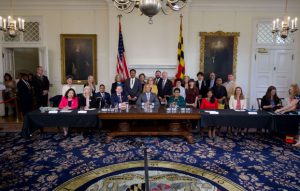The Rural Maryland Council celebrates the bill signing of the Health and Human Services Transportation Improvement Act of 2023
On Tuesday, May 3rd, the Rural Maryland Council celebrated a legislative victory for rural communities with the signing of HB596/SB511 Health and Human Services Transportation Act of 2023.
The passage of this bill allows for the Rural Maryland Council to help establish the Rural Nonemergency Medical Transportation Pilot Program for hospitals to coordinate transportation provided by a nonprofit organization to or from medical services for eligible individuals. “We are incredibly thankful to the Maryland Legislature and the Governor for recognizing the magnitude of this issue. Missing doctors appointments due to the lack of transportation negatively impacts health outcomes. We are proud of the work done through our convening culminating in the passage of legislation and we look forward to implementing this new law,” said Susan O’Neill, Chair of the Rural Maryland Council Executive Board and Executive Director of the Upper Shore Regional Council.
Routinely the Rural Maryland Council (RMC) receives requests to fund health-related transportation projects through the Rural Maryland Prosperity Investment Fund grant program. Examples of these requests include the purchase of vehicles to take patients to dialysis; support the development of computer dispatch software to aid in non-emergency medical transportation; and support salaries and wages of staff that intake and coordinate health transportation needs.
The rise in demand for these requests led RMC to partner with the Tri-County Council for Southern Maryland this past fall to lead three Transportation Health Care Roundtable meetings between healthcare and transportation providers to determine how non-emergency health transportation can be improved in the State. The research and findings generated from these roundtables showed that there is a lack of coordination between the transportation and healthcare sectors, a lack of knowledge of where to go for transportation services, and a lack of resources. Additional findings from the roundtables show that there is a need to develop a rural transit model that provides on-demand services (versus fixed route), and smaller vehicles, and take a more regional approach to support the program. Cross-jurisdictional travel for health care services is often a requirement in rural areas.
With the passage and signing of the Health and Human Services Transportation Act of 2023, the Council is incredibly hopeful that we can look to alleviate some of these difficulties in rural areas throughout the state in order to continue creating a better quality of life. “We thank our sponsors, Senators Arthur Ellis (D-District 28) and Katie Fry Hester (D-District 9) and Delegates Ken Kerr (D-District 3) and the House Health and Government Operations Committee members.”
The Rural Maryland Council (RMC) operates under the direction of a 40-member executive board in a nonpartisan and nondiscriminatory manner. It serves as the state’s federally designated rural development council and functions as the official voice for rural Maryland. The RMC advocates for rural communities and businesses across the state to flourish and to gain parity to their suburban and urban counterparts. The RMC envisions a future where residents in rural communities are achieving success in education and employment, have access to affordable, quality health care and other vital public services, and live in an environment where natural and cultural resources are being sustained for future generations.

Bill Signing of SB511/HB596 Health and Human Services Transportation Improvement Act of 2023. May 3, 2023, By Joe Andrucyk, Patrick Siebert at Governor’s Reception Room, 100 State Circle, Annapolis MD 21401 https://flickr.com/photos/mdgovpics

 1-888-373-7888
1-888-373-7888 233733
233733